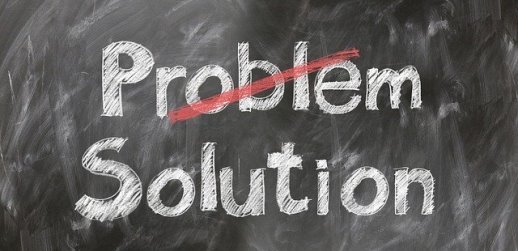12 Symptoms Of And 5 Solutions For Serious Financial Problems
Let’s talk about solutions to your serious financial problems.

Let me explain…
In a recent article, I wrote about the causes of financial problems. And I followed that up with an article about bad financial decision making.
Those 2 articles were meant to help you be proactive with your money. The intent was to provide the knowledge to keep out of financial trouble before it starts.
Let me summarize the purpose of those prior 2 articles:
By understanding the causes of financial problems, you can avoid financial trouble in the first place.
And by avoiding bad financial decisions, you can side-step many other common financial problems too.
But sometimes we make personal finance mistakes. And get into financial difficulties anyway. Serious financial problems become the result despite our best efforts. Or, just because of careless behavior.
If that’s the case, then solutions for those serious financial problems are required.
Symptoms Of Serious Financial Problems

What is the first step to solving serious financial problems? The first step is knowing that there is a problem.
To help out, here are 12 symptoms of serious financial problems. As you read, make a note of how many of these symptoms pertain to you.
Have No Idea How Much Money Is In The Bank
Rarely check bank account balance. Having no idea how much money the account holds. Over-draft charges have been applied to the account because of insufficient funds.
Using Credit Cards For Basic Expenses
Use credit for expenses like groceries and gas for the car. Then, unable to pay off the credit card balances in full. Or meet minimum payment requirements when due.
Not Opening Bills And Credit Card Statements
Ignore bills when they come through e-mail. Or, stuff unopened envelopes containing bills and statements in a drawer.
Pay Bills Late
Pay bills only after they become past due and as a last resort. Late fees have been assessed by service providers.
Discontinuation Notices
The electricity, gas, and water companies have threatened to turn off service. In the worst case, service has been discontinued.
Collection Calls
Past due accounts have been turned over to collection agencies. Periodically dodge incoming collection calls.
Additional Debt
Not thinking seriously about adding more debt. Find yourself saying “just this one more time it will be okay”. Besides, I’m already in debt.”
Paying Off One Debt With Another
Looking for credit card balance transfer offers. And using them to pay off old credit card debts. Also, using a credit card to make the next mortgage, student loan, or car payment.
New Credit Denied
No longer able to get new credit applications approved. Earned a poor credit rating from the major credit reporting agencies.
Look For Alternative Sources Of Money
Borrow money from family or friends.
Taxes
Not paying income taxes. Or, filing a tax return each year.
Arguments About Money
Have arguments about money issues with family or friends.
Do You Have Serious Financial Problems?
How many symptoms mean you have a serious financial problem? Well, there are no exact answers to that question.
But, I would say if you answered yes to more than 2 or 3 of the symptoms, then you have financial trouble. Or, you will have financial stress very soon.
Now we know a problem exists. Your financial goals should include solving the problem as fast as possible.
I’m going to tackle solutions in two different ways. First, depending on the problem, identify some general solutions. Then, no matter the problem, suggest an action plan.
General Solutions For Serious Financial Problems
Let’s break the problems into several categories. Neither the problems nor the solutions are intended to be mutually exclusive.
In other words, more than 1 problem or solution may apply to any person’s situation. However, I always think it’s best to break big financial problems down into smaller ones.
Solutions For Financial Problems Due to Life Issues
One or more sudden and unexpected issues crop up in life
Examples:
- Large decrease in income from job loss or work interruption
- Health and medical issues
- An unexpected new child added to the family
- Big losses on investments gone bad
Solution – When confronted with 1 or more of these events adjust your lifestyle and reduce expenses. Consider moving to a lower cost of living location. This solution applies to most serious financial problems, but especially to these specific events.
Solutions For Financial Problems Due To Major Life Events
Major life events make financial changes a necessity
Examples:
- Retirement
- Divorce

Solution – Downsize your home and move to a cheaper location. Housing costs are one of the biggest expenses in everyone’s budget.
Are you out on your own again or newly retired? Then moving to less expensive quarters can save a lot of money and balance your budget fast.
Just be sure to consider all the pros and cons before you move.
Solutions For Financial Problems Related To Young Adults
Emotional attachment, lack of objectivity, unrealistic expectations
Examples:
- Adult children on economic life support from parents
- Moving out on your own for the first time as a young adult
Solution – Emotionally detach. If you have raised your kids responsibly, it’s time to cut the financial aid. At some point, your finances and a secure retirement must take priority.
Most importantly, as a young adult out on your own, set realistic expectations. You may not be able to provide the lifestyle your parents provided for you.
Solutions For Financial Problems Due To Personal Behaviors
Personal behaviors counter-productive to one’s finances
Examples:
- Drug or alcohol abuse
- Excessive gambling
Solution – Seek help from appropriate and experienced professionals.
Solutions For Financial Problems Due To Lack Of Knowledge

Lack of training about money management
Examples:
- Limited knowledge about personal finance
- Bad financial decision making
Solution – There are plenty of good books, websites, financial coaches, credit counselors, and accountants available. So, pick the right resource for your needs and start learning money management skills today.
Financial Problem Solving Process
So far, we have discussed some general solutions to serious financial problems. But, there’s more. We need a detailed action plan.
Financial problem solving reminds me of my days in the business world. It’s a 4-step process.
- Admit there is a problem, identify it and define it
- Develop a “big-picture”, broad-based solution to the problem(s)
- Create a step by step action plan to put the solution in place
- Take action and monitor the problem until it is solved
So, here we go with a week by week action plan to accomplish these 4 steps.

Immediate Steps To Solve Serious Financial Problems
Week 1 Assess the Situation
It is time to make a complete assessment of your financial situation. So ask yourself, what is the current state of affairs?
We are trying to affect change. And the first step to making a change is to understand the current situation.
Do Your Accounting
So, I want you to document how much money you have. And, where that money is located.
If you have belongings you can reasonably sell for cash in the short-term include those too. Include retirement account savings. For example, it may be better to borrow from your employer-sponsored retirement plan than leave debts unpaid.
Next, do a detailed accounting of your debt. Put every debt owed on a piece of paper or computer spreadsheet. Include the monthly payment and the date it is due.
Yes. We are doing a little accounting work here. I know it’s painful because I used to be an accountant.
Keep It Simple
If you have a computer and are comfortable with spreadsheets use that. If not, a bound notebook is fine. You just need a place to gather and organize your basic financial information.
There are plenty of good personal finance apps available too. But, I’m guessing those who are in financial trouble don’t use them.
So, don’t waste time getting an app and trying to figure out how to use it. A 99 cent spiral-bound notebook is good enough.
That’s exactly what I used in my 20’s before personal computers and apps for handheld devices existed for the masses. It works. At this point, do not over-complicate your finances with technology.
Week 1 Goal
Finally, determine if any of the past due debts can be brought current with available cash. If so, make the payments.
Your first of many financial goals is to use available funds to get creditors off your back. And buy time to move through the action plan.
Next Steps To Solve Serious Financial Problems
Weeks 1-2: Increase Awareness Of Spending Habits
Next, I want you to see and feel where your money is going. To do so, for at least 2 weeks, spend only cash.
Be conscious of where your money goes. Save receipts and put them in a file on your desk.
Personal finance experts suggest that spending cash makes a person more aware of what they buy and how much they spend. So, you are more likely to spend less. And place more value on what you purchase.
At the end of each week, take those receipts and make a detailed list of every item you spent money on and how much. Use the same computer spreadsheet or notebook you started using at the beginning of the week.
Getting Serious About Solving Financial Problems
Week 3: Create A Spending Plan & Get Serious About Cutting Expenses

At this point, it doesn’t matter how much money you are making. If you have financial problems the quickest way out is by reducing expenses.
So, take a look at your expense tracking from the prior 2 weeks. Ask yourself what expenses you can reduce.
How To Reduce Expenses
Take a large expense and make it smaller. For example, find a nice, but low cost place to live.
Take a small expense and make it smaller. Such as, do you purchase coffee out every day? If yes, make it at home. Need it to go? Then buy a cheap commuter mug.
Interest rates are at all-time lows. So, refinance your mortgage if you have one.
Temporarily reduce your life insurance.
Eliminate unnecessary expenses. Memberships and subscription services that have added up over the years are a good place to start. Anything that is not a necessity like rent/mortgage, food, and transportation to/from work is fair game.
Can You Increase Income?
Next, look for ways to make extra income. Can you take on part-time work? Or, start a side hustle?
Personal Cash Flow
What you are doing is looking for ways to increase your cash flow. That extra cash flow will go to pay off your debt.
Resource: Personal cash flow, how to track it and increase it
What you have started in weeks 1-3 is an ongoing process. Spend only cash. Collect your receipts.
Be aware of your expenses, track your spending, reduce costs where you can, and put together a personal cash flow statement.
Don’t worry about making a mistake. It doesn’t have to be perfect. Just get started. And get better as you go.
Make it a game. See how close you can track your expenses to the penny. See how little you can spend. And how much extra cash you can create to pay off debt.
Get on top of this ongoing activity. Then, the monthly bills and debt payments won’t seem so intimidating.
Debt Is The Result Of Serious Financial Problems
Week 4: Create A Plan To Pay Off Your Debts

Now that you have an understanding of your personal cash flow (also known as a budget), it’s time to use it to pay off debts.
Paying Your Debts As They Come Due
Let’s pull together several pieces of information you have worked on thus far. First, the list of all your debts. Second, the monthly required payments on those debts. Finally, the personal cash flow statement you have been working on over the first 3 weeks.
Now, does your excess cash flow meet the needs of those debt payments? If yes, great. Then, continue working this process every day, week, and month to make those debt payments.
Contacting Your Creditors
If no, you have a couple of options. First, consider contacting your creditors. You are now armed with enough information to have a productive conversation. Your goal is to work out a payment plan with each creditor that fits with your cash flow.
Debt Consolidation
Another option is to consolidate all of your debt into 1 loan with 1 manageable monthly payment. According to Debt.Org, there are five main ways to consolidate debt:
- Arrange a debt management payment plan through a nonprofit credit counseling agency
- Transfer unpaid balances to a single credit card with a lower interest rate
- Take out a personal loan
- Use a home equity loan or a home equity line of credit (HELOC) to pay off your creditors
- Borrow from a retirement savings plan like a 401(k) or a Roth IRA
Week 4 Goal – A Manageable Debt Payoff Plan
By doing these steps, you have a plan to pay off your debts. No more discontinuation notices or collection calls to deal with. Plus, a huge reduction in financial stress.
The goal is to set up a debt payment plan where you can make the required payments every month.
Then, keep looking for ways to increase your personal cash flow. In the best circumstances, make extra payments on your debt to reduce it more quickly.
Other Options To Solve Serious Financial Problems
Hopefully, the solutions, action plan, and other resources presented here are enough to solve your financial problems. If not, there are other ideas to consider.
Workplace Employee Assistance Programs
Many employers offer confidential 3rd party employee assistance programs. They are normally offered at no cost to the employee as part of the employer’s benefits program.
These programs employ professionals who can offer assistance with personal issues and money problems. Often these go together. At a minimum, a representative can guide in setting up and managing a budget.
Credit Counseling
Credit counseling is another option. Counselors also offer advice on budgeting, managing money, and other basics of finance.
They can assist people who are unsure of how to approach creditors about a payment plan. In brief, they assist people with the action steps outlined in this article.
Representatives from an employee assistance program or credit counseling agency are advisors. Unfortunately, there are no short cuts.
You will still have to pull together the financial information and do the work. But, if you need a little extra help and advice they are good options to consider.
Personal Bankruptcy
As a last resort, filing for bankruptcy may be an option. There are no clear cut rules on whether or not an individual should file for bankruptcy.
I would say that it should only be considered if none of the other solutions to solving financial problems will provide for a workable debt repayment plan.
On a positive note, bankruptcy eliminates debt and gives a person a fresh start. The downside is it will harm one’s credit and the ability to access money in the future.
It is also typical for employers to perform background and credit checks. So, filing for bankruptcy may hurt your future employability.
Other Issues And Opportunities When Solving Serious Financial Problems
If you get into serious financial trouble, use it as an opportunity to learn as much as possible about money management. Do your best to make finance fun.
When your finances turn in your favor, you have more money and more control over your life. That’s what makes the hard work and learning process pay off.
Finally, watch out for scams and pitfalls. Financial stress can make us vulnerable to scams.
Most scams offer to clean up your credit score for a fee. So, when reaching out for help, do your due diligence. And remember; only you can improve your credit score.
Solving Serious Financial Problems – Wrap Up
We have covered a lot. Make a personal finance goal today to solve your money problems! Here are a few key points to remember.
The first step to solve any problem is to admit you have one. So, go through the 12 symptoms and see how many apply to your situation. More than 2 or 3 and financial challenges are at your doorstep.
Next, identify your financial problems and the general solutions for it. This will give you an overview of the problem and the task at hand.
Then, work through the steps in the weekly action plan. The goal is to put all of the pieces in place so you can pay your bills when they come due.
If necessary, reach out to 3rd party professionals for help with money management. Or, for help in contacting your creditors.
Finally, learn as much as you can about your personal finances. And, watch out for scammers that promise unrealistic solutions for a large fee.
Further Reading About Financial Challenges And Opportunities
Author Bio: Tom Scott founded the consulting and coaching firm Dividends Diversify, LLC. He leverages his expertise and decades of experience in goal setting, relocation assistance, and investing for long-term wealth to help clients reach their full potential.
Hi Tom,
Great advice! From people I know in financial trouble (and others I’ve heard of), the issue with getting out of it often involves a reluctance to admit that a problem exists and a solution needs to be found. Many times, people bury their head in the sand. Of course, there are also inspiring turnaround stories.
Cheers,
Miguel
Hi Miguel. That’s a great point. For most of us (and I include myself), no matter if the problem is financial or otherwise admitting we have a problem is often times the biggest hurdle. Tom
Reading this was making me anxious, haha. This is a good step by step plan on how to get out of financial trouble though with actionable items. We are all in denial for certain things until we open our eyes and see what’s going on.
GYM, No need to be anxious. I’m pretty sure you have all your “financial ducks” in a row. Tom